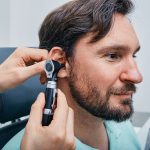Age-related hearing loss becomes increasingly more common in older adults but the signs and symptoms may not be exactly what you think. Furthermore, if you do notice changes to your hearing, what do you do next? Let’s look more into both of these common questions and see if you can start your year with improved hearing.
When should you see a doctor?
Adults, regardless of any signs or symptoms of hearing loss, should obtain a baseline hearing screening or hearing test. This can be used in the future for comparison purposes if hearing loss does develop later on in life.
If however, you are experiencing any signs of symptoms of hearing, the most common of which are detailed below, it is a good idea to make an appointment with an audiologist to determine the cause and possible treatment options.
Possible signs and symptoms of hearing loss vary widely from person to person, below are some of the more commonly reported symptoms.
- Hearing without understanding– The statement “I can hear you, I just can’t understand you” is often said by those with hearing loss. This self-reported distinction between hearing and understanding can also lead to delayed treatment because people tend to think hearing and understanding are different, however this couldn’t be farther from the truth. Age-related hearing loss occurs gradually and impacts higher frequencies of sound first. When sound changes occur in some frequencies but not others it changes how we hear, making understanding more difficult.
- Asking others to repeat themselves– As age-related hearing loss occurs gradually, this tends to be a sign that sneaks up on people. If you have difficulty hearing people who are not facing you specifically or when there is background noise, then these can be signs of hearing loss.
- Avoidance of social situations and phone conversations– When hearing and understanding become more difficult, those with hearing loss have a tendency to avoid the situation altogether. If you find that you are not wanting to go to restaurants or talk on the phone to family and friends, it is important to understand why and if hearing changes are playing a role in these decisions.
What should you expect at your first audiologist appointment?
If you have begun to notice changes to your hearing, it is time to schedule an audiologist appointment. During your first visit, your provider will get a detailed occupational and medical history as well as discuss the symptoms you are experiencing.
Because hearing loss has many potential causes, it is important to give an accurate description of past occupational and medical history. Hearing loss can be caused by age, noise exposure, diseases or disorders, medications, obstructions, and even infections.
Following this discussion, you will likely sit for a hearing test. For the hearing test, you will sit in a small soundproof room with headphones over your ears. Through the headphones, beeps of different frequencies and volumes will play into each ear separately. When you hear a beep, you will press a small clicker in your hand or raise your hand to indicate that you heard the sound.
Once this process is completed, a graph will be printed with the frequency on one axis and the volume on the other. Each ear will be charted in a different color on the same graph. Based on the results of this hearing test, your provider will review treatment options that will best suit your hearing needs.
What are the available treatment options?
The most common treatment for those with age-related hearing loss is hearing aids. Hearing aids today have the ability to be programmed in order to meet the exact needs of each individual’s hearing loss. Using the results of the hearing test, only the frequencies that need amplifying will be corrected and to the exact degree needed. Frequencies that the user already hears normally, will not be amplified at all.
Another possible treatment option for those with severe or profound hearing loss is cochlear implants. Cochlear implants work differently than hearing aids by using a small surgically implanted device to stimulate the auditory nerve.
If you are experiencing any changes to your hearing, make an appointment with an audiologist today to start your year with better hearing!






